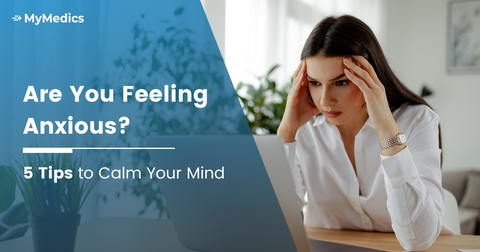
We all experience anxiety at some point in our lives, and for some, it occurs practically every day. However, it is another thing that some people are nervous about huge things while others start worrying about small things. Anxiety is defined as a state of uneasiness, distress, or fear. And, as we all know, everything has pros and cons, and anxiety is no exception. If you are worried about being late for an interview or failing a test, it might be a blessing in disguise and help you prepare as thoroughly as possible.
However, it should be noted that everything is good to some extent. Anxiety or stress can lead to mental illness. When we are in a dangerous, fearful, or anxious scenario, our brain battles it on its own and restores normalcy. But if things do not return to normal and continue for an extended period of time after the threat has passed, It is an anxiety disorder that can have a negative impact on your everyday life and can make you feel that things are worse than they are. Hence, the anxiety disorder must be managed gradually.
But now you must be wondering how to stop feeling anxious. Well, need not worry. We are here to suggest 5 effective tips that will help you combat such things and calm your mind.
- Broaden Your View: Are you dwelling on the most dangerous components of a scenario rather than viewing the whole picture? Anxiety causes our thinking to constrict and focus on the current threat without contemplating the larger context. Ask yourself some questions: Is this issue truly as critical as your fear suggests? Will you still be concerned about this issue in 5 or 10 years? If not, then calm down.
- Do Exercise: Exercise can help with anxiety in two ways. For starters, it lowers stress hormone levels in the body. Second, it directs people’s attention to the task of exercising, which might divert them from introspective thoughts. Just 5-7 minutes of cardiovascular activity, such as a brisk stroll, might help you relax. It causes the production of endorphins, which are molecules that make you feel good and can help you enhance your mood, attention, and sleep.
- Talk to a Friend or Someone You Trust: People might get anxious when they are isolated and do not communicate their anxieties or problems with others. Talk to your friends or loved ones about how you’re feeling and check in on how they’re doing as well. Talking to someone else can help us release some of the mental strain we accumulate, as well as break down how to handle problems that are creating or contributing to our anxiety.
- Listen to Music: Music may stimulate reward circuits in the brain, increasing feelings of pleasure while decreasing tension and anxiety. By listening to music lesser neurons activate in the amygdala (the portion of the brain that responds to fear), which may result in fewer messages being delivered to other sections of the brain. If you’re distracted by discomfort, try listening to music. Pay serious attention, not simply as background noise. The more you observe, the less you’ll think about other things.
- Write it down: When another individual cannot comprehend the gravity of your concerns, you are left wondering what to do next. Now it’s the question that what to do when you are feeling anxious? Stop thinking and just pull out a journal and jot down your emotions. Don’t worry about sentences or words; simply write. Writing assists you to clear your mind of negative ideas. You may go a step further and make an action plan to keep your mind cool once you’ve finished writing.
In final words, If you are feeling anxious all the time and your emotional problems are interfering with your everyday life, consider whether your anxiety is affecting your quality of life, studies, employment, relationships, and capacity to care for yourself, or whether it is out of scale with how you would ordinarily behave in a stressful circumstance. Then it’s time to seek expert assistance. Talking to a therapist, psychologist, or psychiatrist who can cure the underlying problem may make you feel better.
Also Read: Top 5 Benefits of Booking Your Doctor Appointments Online